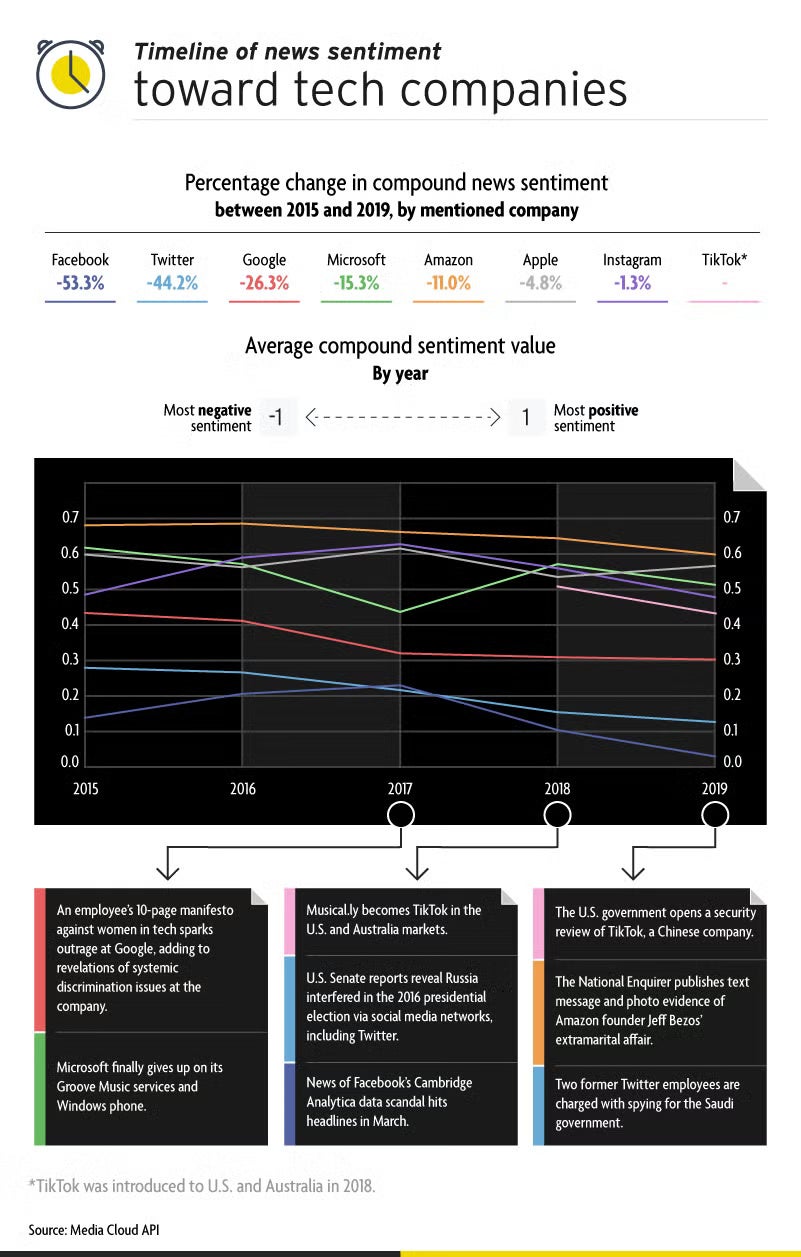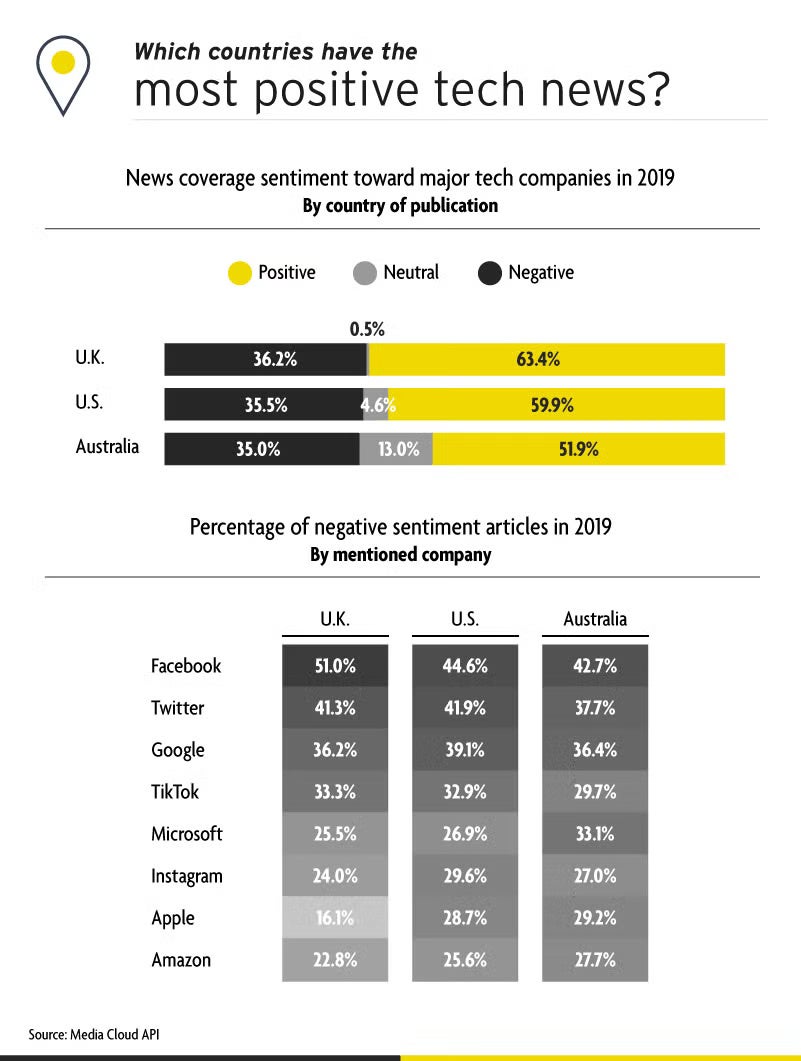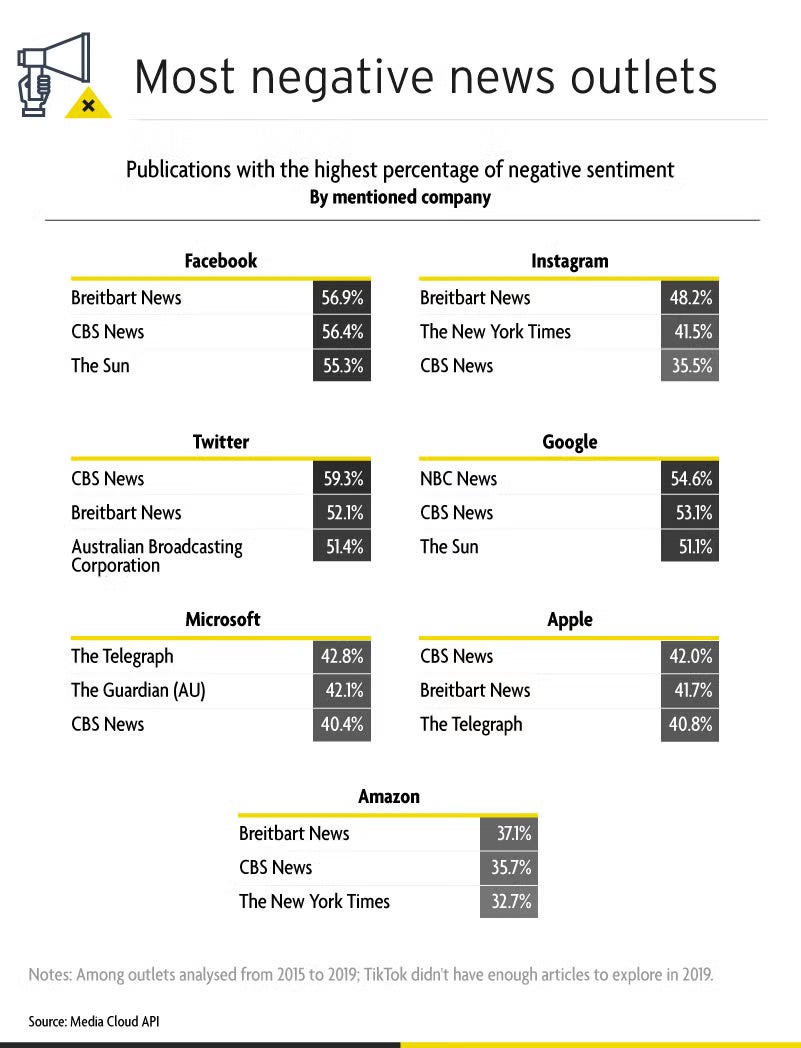Google, Facebook, Apple and a host of other tech companies have come to dictate modern life. Whether we're shopping for groceries, posting pictures of our friends, or sharing financial data with a multibillion-dollar powerhouse, one could make the argument that becoming patrons of these tech giants is almost inevitable. But have recent scandals and controversies around some companies changed how the public views and uses their services?
We collected more than a quarter-of-a-million articles to learn how the media has discussed major tech companies, like Facebook, Amazon, Twitter, and Instagram, since 2015.
We started by analysing the sentiment of each article mentioning these companies using the Simplifying Sentiment Analysis method with VADER in Python. We included articles from 30 publications across three countries: the U.K., the U.S., and Australia. With this technique, we were able to identify and extract aggregate opinions on today's top tech companies from major news outlets.
The sentiment behind these articles reveals quite a few interesting truths about news coverage and tech companies today. Read on to discover these truths for yourself.
Should you be interested in mastering the skills required to discover key insights about our society, UNSW now offers an entirely online Master of Data Science program.
Tone of tech coverage
Our initial question was simple: Is coverage of tech companies good or bad? Of the 250,000-plus articles analysed from 2015 to 2019, 57% had a positive sentiment. However, each year brought changes in media sentiment.
Negative mentions of tech companies increased year over year, without exception. Neutral coverage also declined during this same period. Articles mentioning Facebook had the most negative sentiment, with 39.4% of articles mentioning the company having negative overtones. Google also took nearly as much heat as Facebook, but it had 16.6 percentage points more articles with positive sentiment.
Speaking of positive reviews, Amazon (the only e-commerce company analysed) had more articles with positive sentiment than any other company, and Apple took a close second. But the story once again changed shape when we dug in further.
Tracking sentiment over time
From the compound sentiment values revealed by VADER, the average news sentiment for all tech companies decreased from 2015 to 2019. But Facebook took the cake: Sentiment via major news organisations became darker and darker.
Looking at the dark blue line in the graph above, the compound sentiment values of articles mentioning Facebook took a particular nosedive in 2017. Since then, Mark Zuckerberg has testified before Congress twice, lost $120 billion in stock market value during the Cambridge Analytica scandal, and experienced a user base that declined by more than 15 million people. Needless to say, it was a tough few years for Facebook in the news.
Privacy issues and data breaches (at Facebook and elsewhere) were often the catalyst for negative news coverage. Instagram's positive coverage reached a near-all-time low in 2019 when they admitted that a marketing partner had taken private data from millions of users. TikTok, the newcomer on the tech block, is also off to a rough start in the press and saw negative sentiment increase after the U.S. government opened a security review on the Chinese-owned business.
Twitter was one of the only companies studied that never experienced a single year of improvement. In particular, 2018 was a tough year for Twitter, when U.S. Senate reports claimed Russian interference in the 2016 presidential election via Twitter and other social media networks. The following year, two former Twitter employees were charged with spying for the Saudi government. The company has also been shamed for its relatively open arms toward hate groups.
Most critical countries
Media in the U.K., the U.S., and Australia stood united in sentiment toward tech companies. In comparing hundreds of thousands of data points across these countries, there was no more than a single percentage point of difference in the negative sentiment of articles mentioning tech companies.
Articles out of the U.K. did have the most positive sentiment, however, as well as the fewest neutral articles. British media also had the highest percentage of negative articles mentioning Facebook, even more than the U.S. and Australia. Although Zuckerberg agreed to testify in front of the U.S. Congress, the company didn't comply as easily with the British government around the same time. The British Parliament requested a data abuse probe of the company on their own terms, which never came to fruition.
On the other hand, the U.S. media may have particularly taken issue with Google. With net neutrality making repeated headlines in 2019, the world's largest search engine became a key (and possibly sinister) player in determining just how free we really are while using the internet.
Australian news articles featuring Microsoft were more negative than the other two nations. Although the company and country struck a major business deal recently, negative coverage could have arisen when Microsoft suggested Australia wasn't safe enough for data storage.
Pessimistic press
Looking beyond countries and at their specific publications, we were able to pinpoint some particularly strong sources of negativity.
Breitbart News, a U.S.-based right-leaning news outlet, had the highest percentage of negative articles featuring Facebook, Instagram, and Amazon. Their negative coverage of Facebook is somewhat surprising, as Zuckerberg has come to their defence when questioned whether the publication belongs on Facebook's news section.
The Telegraph (U.K.) and The Guardian (Australia) had particularly high rates of articles with negative sentiment toward Microsoft. Some of this negativity may have again been sparked by data breaches and privacy issues. The Telegraph reported in 2019 on Microsoft listening to Xbox gamers without permission, and interviewed CEO Brad Smith about the ethical implications of warfare related technology. Although Smith didn't imply that Microsoft was working on this type of technology, articles on topics like this take a serious tone and express negative sentiment.
Reasonable reporting
The data analysed ultimately revealed a steady increase in negative articles mentioning major tech companies. This could be due, in part, to an increase in negative stories, scandals and controversies surrounding these companies.
With a constant deluge of social media posts and news coverage concerning these companies, aggregate data and sentiment analysis of this kind can help point to a more objective and even numeric form of truth. Putting sentiment into clear-cut, graphical terms is just one way that data and the science behind it can explain the truth to citizens.
Find out how you can sharpen your existing data skills or embark on a new career with one of the top three universities in Australia for graduate employment rates. Head over to the Master of Data Science program page or chat with an Enrolment Advisor about how you can embark on a path toward a data science career.
Methodology
We gathered 274,410 articles from Media Cloud, dating back to 2015. Media Cloud is an open-source platform for studying media ecosystems. We gathered articles mentioning Facebook, Instagram, Twitter, TikTok, Google, Amazon, Microsoft and Apple from more than 30 international news publications. False-positive results for articles mentioning "Amazon" or "Apple" that were unrelated to the tech companies were removed.
The amount of articles from each publication is as follows:
- Australian Broadcasting Corporation (ABC): 4,662
- Australian Herald: Breaking News from Australia Online: 3,008
- Australian News.Net: Daily Australian, World & Business News: 3,251
- BBC News: 10,399
- Breitbart News: 8,697
- CBS News: 10,303
- CNBC: 5,337
- CNN: 10,090
- The Daily Caller: 8,335
- Daily Mail Australia: 4,474
- The Telegraph: 9,217
- The Telegraph Australia: 4,955
- Daily Mail: 5,828
- Daily Express: 13,266
- Forbes: 5,407
- Fox News: 7,915
- HuffPost: 7,041
- The Independent: 17,341
- NBC News: 5,800
- The New York Times: 8,894
- News.com.au: 10,727
- New York Post: 10,508
- The Age: 12,325
- The Australian: 5,207
- The Guardian AU: 6,577
- The Guardian: 7,009
- The Sun: 9,381
- The Sydney Morning Herald: 12,364
- The Mirror: 11,830
- USA Today: 10,451
- The Wall Street Journal: 12,573
- The Washington Post: 11,238
We accessed the Media Cloud archive in January of 2020. After gathering the articles from Media Cloud, we accessed the article text using Newspaper3k. Then, all articles were analysed using the VADER (Valence Aware Dictionary and sEntiment Reasoner) sentiment analysis in conjunction with the Natural Language Toolkit (NLTK) library in Python, which provides a sentence-level analysis of long-form text and computes aggregate scores per article for positive, negative and neutral sentiment. For the majority of our analysis, we only looked at positive and negative sentiment.
Each article received a score for both positive and negative sentiment. To make a meaningful comparison between these two scores for each article, positive and negative polarity scores were independently normalised according to a normal distribution. To determine whether an article was positive or negative, we compared the two z-scores and chose the higher one.
Limitations
While we did include several media outlets from the U.S., the U.K., and Australia, the analysis is not reflective of all media from these nations. Additionally, sentiment analysis of text does not necessarily reflect whether a publication supports a given company, but rather reflects the type of language used in articles discussing the company, and our net scores (which were used to rate each article as "positive" or "negative") were computed based on the mean of only the articles surveyed in the study.
Fair Use Statement
Know any newshounds who might be interested in our findings? We hope you'll share this project with them and any others who might be interested. We do have two simple requests when it comes to sharing. First, please link back to this page so that others can explore all our results. Second, use this content only for noncommercial purposes. Thank you in advance for helping this project find a wider audience.








